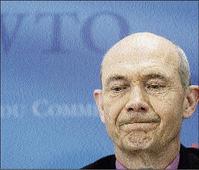
World Trade Organisation (WTO) director general French Pascal Lamy during a press conference after crucial trade talks collapsed, during the World Trade Organization ministerial summit on trade liberalisation, at the World Trade Organization headquarters, in Geneva, Switzerland, Tuesday.
The blame game began immediately over who was responsible for the collapse of seven years of talks at the World Trade Organization (WTO) in Geneva last week.
The United States blames India; India blames the US; and France blames India and China.
But for Peter Mandelson, the real spoiler was the United States.
Mandelson, the European Union's top negotiator, said he had tried to broker a deal on the farm-import issue that ultimately divided the United States and developing countries led by China and India.
Rejections
While both sides rejected the compromise, Mandelson reserved his sharpest criticism for US Trade Representative Susan Schwab, accusing her of refusing to budge even when her demands were met and then going public with her grievances too quickly.
"It is bad enough to be facing defeat in the last mile of such a marathon," Mandelson wrote Wednesday in his blog. "It's worse to realise that some of the people across the table, instead of working for success, are in reality preparing for failure."
The US rejected his description of events behind closed doors at the WTO's Geneva headquarters. Gretchen Hamel, a spokeswoman for Schwab, noted that the EU's renegotiating was rejected by multiple countries, and was aimed to "deflect attention from the EU's own domestic concerns."
These would include Europe's own defensiveness to opening up farm markets to imports of beef, poultry, sugar and other products.
Agricultural imports
Agricultural imports are especially sensitive in France, where President Nicolas Sarkozy has regularly pointed the finger at Mandelson for conceding too much to competitors in the developing world.
Mandelson's criticism of the US comes after weeks of close cooperation between the trans-Atlantic partners.
Over the weekend, he told trade ministers from the EU's 27 member countries that he and Schwab were "joining up, but not ganging up" to push the negotiations forward.
While the trade talks launched in the Qatari capital of Doha in 2001 have struggled before, this failure was perhaps the most devastating.
Faced with global unrest from rising food prices, credit problems from shaky financial markets and the threat of economic downturn, negotiators hoped that a deal this week to open farm and industrial markets would go some way to alleviating these problems.
The collapse was all the more painful as negotiators made more progress than they had in years on issues such as farm subsidies and manufacturing tariffs, which were responsible for breaking previous high-level trade efforts.
'Safeguard' discussion
But the talks hit a snag over an obscure 'safeguard' for protecting agricultural producers in the developing world from a sudden surge in imports or drop in commodity prices.
While such safeguards currently exist in rich and poor countries, they are rarely used and reflect only a minute portion of the billions of dollars in manufacturing, farm and services gains the WTO's Doha trade round was supposed to create.
Schwab told journalists Wednesday that the dispute with China and India "really wasn't a political discussion" but one over trade policy. She said the two emerging powers were demanding a "free-for-all" that would regularly allow them to raise tariffs on goods such as soybeans, poultry and palm oil, hurting American exporters.
That, Schwab argued, went against the basic idea of the WTO's current trade round, which is to alleviate poverty and boost the global economy by making it easier to export farm produce and manufactured goods.
WTO chief Pascal Lamy said it was too soon to say where the talks should go from here.
"We will need to let the dust settle a bit," said Lamy, whose own term as director general ends next year. "WTO members will need to have a sober look at if and how they bring the pieces back together."
- Gleaner and AP reports

